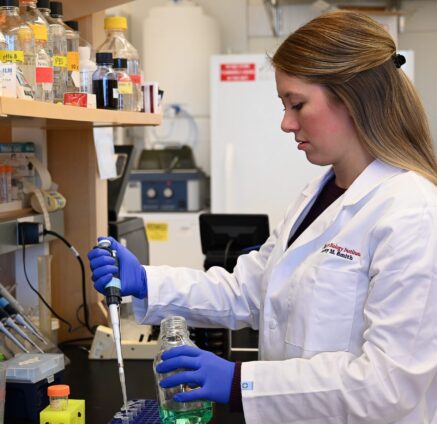Q&A with Dr. Zhicheng Wang: Improving the Safety and Efficacy of mRNA Technology
February 26, 2024Zhicheng Wang, PhD, is a postdoctoral trainee at the University of Pennsylvania and recipient of the 2023 PhRMA Foundation Postdoctoral Fellowship in Drug Delivery.
Tell us a bit about yourself and how you became interested in research.
I am a postdoctoral fellow in Dr. Jake Brenner’s lab at the University of Pennsylvania. I’ve been particularly interested in biology and chemistry since I was in high school. My high school biology teacher was a funny and smart person who often took us on field trips and taught a lot of college-related courses. She took us to the lab in our local university to learn a lot of experiments and encouraged us to participate in different biology competitions. I’ve been interested in research ever since!
Briefly describe your PhRMA Foundation-funded research project and its potential impact on patients.
The messenger RNA (mRNA) technology used to develop COVID-19 vaccines has the potential for treating other diseases, but there are challenges that could limit its use. mRNA, a molecule that contains instructions for protein production, is delivered into cells by using lipid nanoparticles (LNPs) as a protective bubble. The mRNA tells our cells to make proteins like those on the COVID-19 virus, which triggers our immune system to recognize and fight the disease. However, LNPs quickly bind with proteins in the blood, causing a reaction similar to anaphylaxis and making them susceptible to elimination by immune cells. In addition, when immune cells take up these LNPs in animals with existing inflammation, the inflammation significantly worsens. My research aims to modify mRNA-LNPs to avoid these drawbacks. We will attach two components — Factor I (a natural enzyme that breaks down complement proteins) and CD47 (a “don’t eat me” signal) — to the surface of the LNPs to try to prevent them from being taken up by immune cells. If successful, this project could significantly advance mRNA technology, making it more effective and safer for therapeutic applications beyond COVID-19 vaccines.
How will the PhRMA Foundation’s support impact your research and your career?
Receiving the PhRMA Foundation’s support means a lot to me; it not only recognizes my past work and efforts, but also provides great support for the research direction I have chosen. I am confident that I can further improve my current work, as well as to better enhance the safety and efficacy of vaccines for the better life of mankind.
What has surprised you the most in your research journey so far?
One research experience from my college days stands out in my mind. We were looking for a bacteria that could convert waste oil into biodiesel. We asked for help from all the students in our department. Over summer break, they collected and brought us soil from gas stations, restaurants, or any potential place near their hometowns. Their assistance helped us to find and cultivate a new strain of the bacteria.
What has been challenging in your research journey and how did you overcome it?
My biggest challenge in my research journey has always been discovering which projects that are truly worth studying and to keep digging. That will always be the challenge on my research journey.
What advice would you give to other young researchers, such as those applying for PhRMA Foundation awards?
Don’t give up on your research project if you believe it is useful to mankind.
What are your future career aspirations?
That’s a good question. Could I say get a Nobel Prize? Dr. Drew Weissman, a neighbor in my department, just got one this year!

